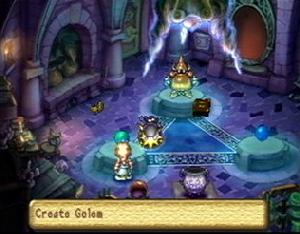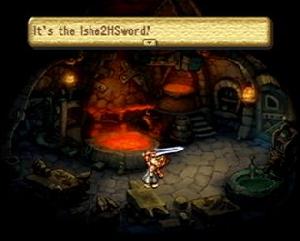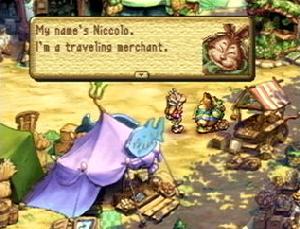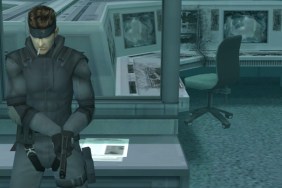It’s no secret.
Mother Goose. The Brother’s Grimm. That Aesop guy. Remember them? Those books
full of short stories filled with morals and lessons? Well, at least try to
remember the Rocky and Bullwinkle versions of them (Fractured Fairy Tales).
Alas, television and videogames have replaced the storytellers from the days
of old. In many ways, Legend of Mana is like a book filled with many
short stories. It’s just too bad they’re not strung together well.
The big picture is that there’s this Mana Tree, weeping its little eyes out because everyone’s forgotten it. Oh boo hoo. Since people have forgotten about the tree, the land has fallen into peril. You play a nameless character (boy or girl) out to restore the land to its former good graces. The stories within the game revolve around the different people that you meet.
The nameless character chooses one of several weapons. The timing bar from
the original Secret of Mana has been replaced by a combo system; combos
are mostly comprised of three button chains. You start out with some initial
types of moves and develop more abilities later on. It’s pretty much hack and
slash gameplay.
Battles end up more of a mashing frenzy compared to the strategy bend of the original. Item usage during fights is completely done away with; your health is reset after each battle. And those useful ‘circle’ menus have been all but removed from the game.
In an interesting twist, you create the world of LoM by selecting a
portion of terrain from a large map. Then, by placing magical artifacts onto
the terrain, areas are created. Put a mailbox down, and you create your house.
Place a broken doll by the coast, and it becomes the Land of Misfit Toys.
Within each area, there’s at least one quest/short story for you to undertake. As you complete each quest, you gain more and more artifacts, allowing you to create more areas. In turn, each of the different areas is made up of many different sections.

A section is small; at most, it would be 2 screens tall by 3 screens wide. Sections
are connected to more sections. Well, not so much connected – sections are separated
by annoying loading times. Whatever happened to the idea of an expansive world
to explore? Exploration is now reduced to whether you should take Path A or
Path B. That feeling of wide-open space isn’t there; the game is really just
little quests without a strong thread to tie them together.
There are spots of cleverness here and there in the writing. For example,
Duelle the Onion Warrior. What’s an Onion Warrior? Hell if he knows. Mostly,
the writing is funny but simple, nowhere near the complexity of Square’s recent
beauty, Vagrant Story.
Speaking of which, this game is beautiful. If you want to see what sprite-based graphics should look like, then look no further. Artistic and detailed, the graphics look like illustrations out of a long forgotten storybook with a watercolor, organic feel to them. The different characters are well drawn and animated – even Niccolo the fat bunny.
The music fits the nature and mood of the game to a tee. Or should I say Teapo? Teapo is this fat teapot that bounces around ‘talking’ with a little British accent. In one short story, she gets lost and starts crying. Funny, but what would have made it even funnier is if I could have heard her sad ravings AUDIBLY. Once again, I’m bitching that there’s no voice.
Legend of Mana is a seemingly attractive beauty. But once you start
talking to her, you realize all she has are these vacuous little stories that
just go on and on, one after another. You try to ignore the lack of depth, but
you can’t. If only LoM was more like her older sister, Secret of Mana.
Sure, Secret isn’t as hot, but she had one great story to tell, more
depth, aaaand she gave really good gameplay. (Johnny needs to get out more.
– Ed.)
Overall, Legend of Mana is good for a few quick shots – play through
a story and then stop for another day. It’s just not continuously fun in large
doses, though at least some of the new ideas were worth a try.

-
Artistically beautiful graphics
-
Basic but fun combo system
-
'Quickie' shots of short quests
-
Lacks depth
-
Item usage and weapons swapping







